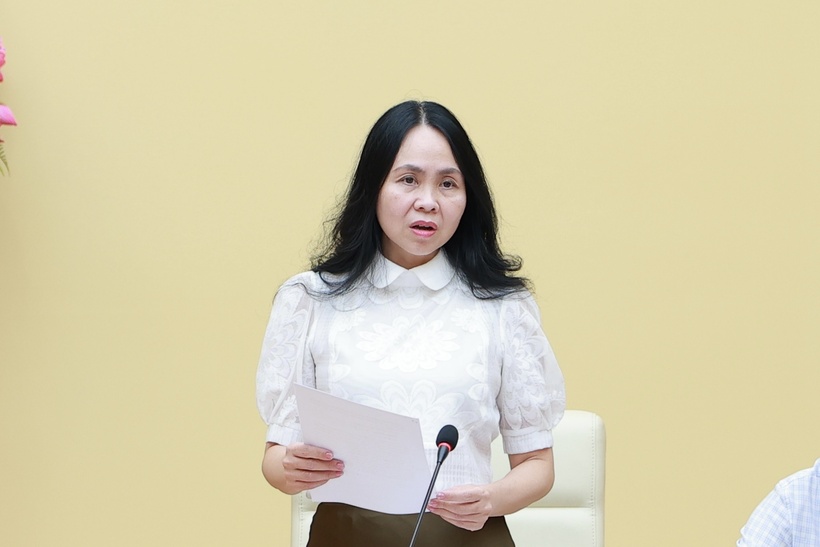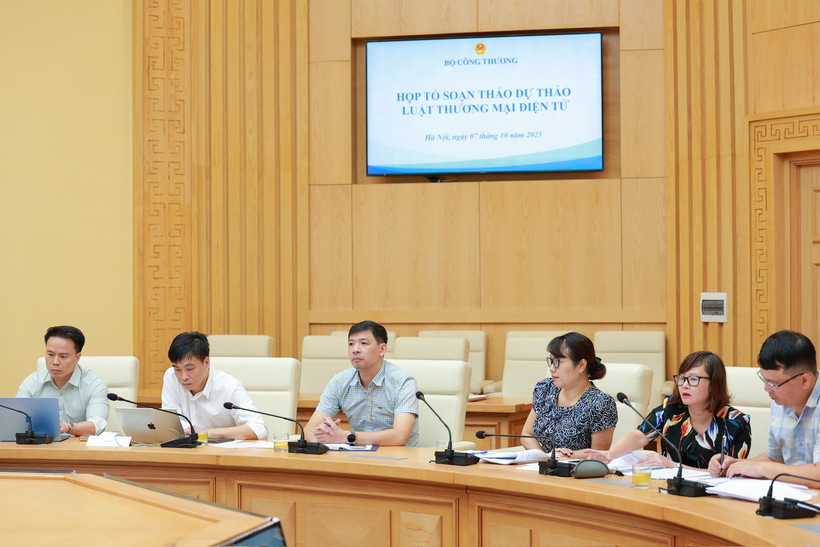
VCC reviews 2025, sets key tasks to boost competition and consumer protection
19:05 | 23/03/2025 14:11 | 08/01/2026Industry
Drafting completion phase
On the morning of October 7, in Hanoi, the Ministry of Industry and Trade held a session of the Draft E-Commerce Law Drafting Team, chaired by Deputy Minister of Industry and Trade Nguyen Sinh Nhat Tan. This important session aimed to finalize orientations, review and respond to feedback from National Assembly deputies, ministries, ministerial-level agencies, and drafting team members before submitting the dossier to the Government and the National Assembly at the upcoming 10th session.
In his opening remarks, Deputy Minister Nguyen Sinh Nhat Tan emphasized that the law-drafting process has gone through multiple rounds of discussion and workshops and has now reached the final completion stage.
“Currently, the Ministry of Industry and Trade is coordinating with relevant National Assembly agencies to review the entire content and dossier, ensuring that the process of receiving and responding to feedback reflects practical realities, while also aligning with the new legislative requirements in the digital transformation era”, the Deputy Minister said.
Deputy Minister Nguyen Sinh Nhat Tan also clarified major issues of concern to National Assembly deputies, including the scope of regulation, regulated subjects, consumer protection, and vulnerable groups.
Reporting on the progress of the draft law, Le Hoang Oanh, Director of the Department of E-Commerce and Digital Economy, stated that the Ministry of Industry and Trade has incorporated numerous contributions from ministries and National Assembly agencies, resulting in significant adjustments, particularly clarifying the scope of regulation, interrelations among laws, and the responsibilities of e-commerce platforms.
During the session, drafting team members provided substantial input to finalize the draft law, ensuring compliance with procedures, regulations, and alignment with the Government’s orientations and policies for e-commerce development in the new phase.

Drafting team session on the draft E-Commerce Law
Contributing at the session, Ngo Chung Khanh, Deputy Director of the Multilateral Trade Policy Department, emphasized that, in drafting the law, particular attention should be paid to requirements for foreign e-commerce platforms to have a representative in Vietnam. He stressed that this regulation aims to protect consumers and strengthen state management.
From the domestic perspective, Bui Nguyen Anh Tuan, Deputy Director of the Department of Domestic Market Management and Development, focused on Article 41 of the draft, relating to special policies supporting vulnerable groups. According to him, these policies have practical significance, especially for cooperatives, ethnic minorities, and populations in mountainous and island regions.
“We should not let the provisions remain declarative. They need to be concretized through programs supporting digital infrastructure, online sales training, and market linkage for cooperatives, farmers, and ethnic minority communities”, Tuan emphasized.
The Deputy Director also noted that domestic e-commerce is growing rapidly, with the growth rate rising from 18% per year previously to over 30% in the first nine months of this year, demonstrating the market’s strong ripple effect when guided by appropriate policies. Therefore, e-commerce support policies should be integrated into national target programs to ensure sustainability and coherence.
In response, Deputy Minister Nguyen Sinh Nhat Tan highlighted that alongside policies, implementation measures and supporting resources are key factors. “For cooperatives, collective economy entities, and mountain communities, provisions need to be specific and feasible. Competent agencies should study ways to integrate e-commerce development into target programs, covering infrastructure, platforms, and online sales support policies,” he emphasized, noting the effectiveness of existing models where traditional market and small trader support has been successfully combined with e-commerce to create new channels for agricultural and specialty products.

Deputy Minister of Industry and Trade Nguyen Sinh Nhat Tan
At the session, representatives of the General Department of Taxation, Ministry of Finance, provided input on data storage, e-commerce databases, and taxation policies for the sector.
The General Department of Taxation proposed extending the minimum data retention period for goods and services information on e-commerce platforms from 12 months to over 24 months, aligning with Decree 53/2022/ND-CP guiding the Cybersecurity Law, and supporting effective tax management for e-commerce transactions and livestream sales.
Regarding Article 44 on e-commerce databases, the Tax Department recommended clarifying the responsibilities of the Ministry of Industry and Trade in three areas: issuing data connection standards among ministries, developing technical infrastructure for information sharing, and establishing data-sharing mechanisms with relevant ministries and agencies.

Director of the Department of E-Commerce and Digital Economy, Le Hoang Oanh, provides information on the progress of finalizing the Draft Law.
On tax policy, the Tax Department supported researching suitable incentives to promote e-commerce but emphasized that these incentives must be integrated within the legal tax framework, including the VAT Law and Corporate Income Tax Law. The agency noted that this year e-commerce tax revenue has increased by 50-60%, partly due to retroactive collection from previous years and increasingly consistent and transparent management.
At the session, the Ministry of Science and Technology suggested reviewing and removing unnecessary or inconsistent terminology in Article 3 of the draft law. Regarding electronic contract authentication services, the Ministry proposed expanding the scope of “electronic contract data” to include certificates, documents, and data arising both before and after signing, ensuring integrity and evidentiary value.
“In addition, provisions should be added on prohibited acts under relevant laws, extending data retention beyond 24 months to suit electronic transaction characteristics, and revising overlapping or inconsistent clauses in Articles 35 and 47. The Ministry also proposed regulations on license changes, content amendments related to violation handling, and transitional provisions to ensure consistency, feasibility, and alignment with existing law,” the representative clarified.
Clarifying and specifying key contents
Representatives from the Trade Promotion Department, Ministry of Industry and Trade, recommended the drafting team clarify and specify certain key contents in the Draft E-Commerce Law.
“Provisions related to the concept of ‘large digital platforms’ (Articles 3, 16, 17, 18, 31) lack clear quantitative criteria; without measurement, practical application, particularly regarding management, inspection, and platform owner responsibilities, will be difficult. The Department recommends referencing criteria from other legal documents (Electronic Transactions Law, Consumer Protection Law), e.g., a user threshold of approximately 3 million for consistent application”, the representative noted.
Regarding “green e-commerce” in Article 39, the Department indicated that the draft does not link to green or sustainable standards, which may lead to each platform setting its own criteria.

Drafting team session attendance
The Trade Promotion Department also recommended reviewing consistency between digital environment trade management and promotion regulations with advertising and promotion laws to avoid overlapping authority, while ensuring mechanisms to encourage sustainable e-commerce development.
Contributing at the session, the Legal Department of the Ministry emphasized that the Draft E-Commerce Law should reflect the true nature of each relationship in the sector.
“Specifically, the relationship between service providers and customers differs from that between service providers and state management agencies. Therefore, the law must be designed flexibly to safeguard consumer rights while clarifying responsibilities, obligations, and coordination mechanisms with regulatory bodies”, the representative stressed.
On banking-related scope, the Legal Department recommended adding provisions for cases not regulated by banking law, where the E-Commerce Law would apply. The representative also noted that many banking applications currently provide e-commerce services, such as lottery ticket sales and online movie viewing, which are not yet subject to regulation.
The Legal Department further noted that cross-border services in agreements do not include e-commerce in the narrow sense; treating them as ordinary cross-border services would create inequality in tax and legal obligations. The representative stressed the need to ensure equality, comply with the Constitution and international commitments, and protect domestic enterprises in the integration and law implementation process.
Concluding the session, Deputy Minister Nguyen Sinh Nhat Tan requested the Department of E-Commerce and Digital Economy to promptly consolidate and specify the contents contributed by drafting team members to meet the schedule for work with the National Assembly’s Economic and Financial Department. He emphasized that these contributions are crucial for completing a feasible draft law aligned with international commitments.
For issues with diverse opinions, the Deputy Minister requested particular attention to cross-border e-commerce provisions to ensure strict compliance with international treaties signed by Vietnam.
On counterfeit and fraudulent goods, the Deputy Minister noted that the National Assembly considers this a key factor for consumer trust; therefore, regulations must further clarify the responsibilities of intermediary e-commerce platforms in monitoring goods and services sold on platforms, linked to government anti-fraud and intellectual property programs. E-commerce development must be based on consumer trust to succeed.
The Deputy Minister also suggested adding provisions for socialized support for e-commerce, particularly from e-commerce enterprises, treating it as both an obligation and a marketing tool to protect brands and expand scale. Emphasis should also be placed on reducing compliance costs for enterprises by quantifying and classifying data and processes while maintaining obligations to the State.
Finally, the Deputy Minister affirmed that all administrative procedures in e-commerce must be fully digitized and cannot be managed manually in the digital transformation context. He requested the drafting team to fully incorporate feedback and finalize the draft promptly for submission to the National Assembly, aiming for a stable, feasible and long-lasting law.

19:05 | 23/03/2025 14:11 | 08/01/2026Industry

19:05 | 23/03/2025 14:08 | 08/01/2026Trade

19:05 | 23/03/2025 14:07 | 08/01/2026Trade

19:05 | 23/03/2025 14:06 | 08/01/2026Trade

19:05 | 23/03/2025 14:03 | 08/01/2026Industry